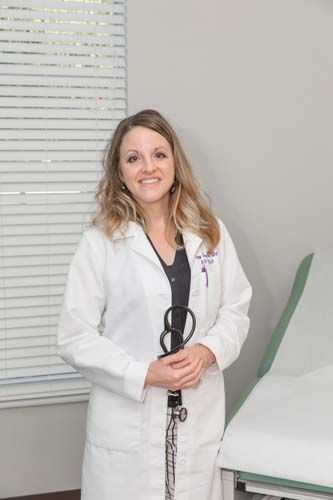
Most women of a certain age are familiar with the benefits of estrogen therapy for the treatment of menopausal symptoms, such as hot flashes, fatigue, insomnia, mood swings and reduced sexual drive. Estrogen therapy can also improve bone density and reduce the risk of osteoporosis.
Now, a new study, published in Menopause, the journal of the North American Menopause Society (NAMS), suggests that estrogen therapy can also lead to healthier teeth and gums. Dr. Kristy Crawford, DO, of IRMC’s Partners in Women’s Health practice, is familiar with the NAMS study and says it is both well-researched and well-written.
Due to falling levels of estrogen (a hormone produced by the ovaries), menopause can be a time when teeth and gums become more susceptible to disease, leading to inflammation, pain, bleeding and even the loss of teeth. In the NAMS study, 492 postmenopausal Brazilian women between the ages of 50 and 87 were evaluated to determine if osteoporosis treatment improved their overall oral health: 113 were treated with osteoporosis drugs and 379 were not. Treatment consisted of estrogen alone or estrogen plus progestin (another hormone) and included calcium and vitamin D supplements.
The rate of severe periodontitis – a serious gum infection that can destroy the jawbone – was 44 percent lower in the treated group than it was in the untreated group; the theory being that the estrogen treatment helped increase the bone mineral density in the jaw, leading to a lower incidence of jawbone damage.
Dr. JoAnn Pinkerton, NAMS executive director, says “osteoporosis can occur throughout the body, including the jaw, and lead to an increased risk of periodontal disease. This study demonstrates that estrogen therapy, which has proven to be effective in preventing bone loss, may also prevent the worsening of tooth and gum disease.”
In addition to the treatment of menopausal symptoms and osteoporosis, estrogen is used as a therapy for certain types of breast and prostate cancers, and for conditions caused when the body does not produce enough of the hormone. IRMC’s Dr. Crawford sounds a cautionary note about how estrogen therapy is prescribed, saying, “Reducing the risk of osteoporosis is a secondary benefit of estrogen, but it [is not] … prescribed as a primary treatment for osteoporosis.”
The significance of the NAMS study is underscored by another, larger study from the University of Buffalo suggesting that tooth loss and periodontitis are a predictor for a significantly increased risk of death. In that study, information was gathered from 57,001 women, with an average age of 68. Loss of all teeth was associated with a 17 percent increase in mortality.
The lead author of the University of Buffalo study, Dr. Michael J. LaMonte, hypothesizes that tooth loss probably reflects more than just oral hygiene, and it could be influenced by health factors such as diet, smoking and other conditions that accumulate over a lifetime. Dr. LaMonte says “we see tooth loss as a proxy measure for poorer overall health than in those who keep their teeth.”
The University of Buffalo study also showed that gum disease by itself was not as dangerous as full tooth loss, but was still associated with a 12 percent increased risk of mortality. Bacteria is one culprit: The inflammation associated with gum disease can cause bacteria to enter the bloodstream, which can lead to infection (septicemia), heart disease, diabetes, respiratory problems, osteoporosis, rheumatoid arthritis and other potentially serious health conditions.
Estrogen therapy can be delivered to the body in a number of ways; most commonly via a pill. It is not without risk – on its own, estrogen causes a slight increase in the incidence of strokes and blood clots; when combined with progestin, the risks of heart attack also rise. Oral estrogen can also be hard on the liver, so those with liver damage or disease should avoid taking it.
However, Dr. Crawford encourages women to see their gynecologist if they are suffering from hot flashes or other menopausal symptoms. “Some women are scared to death of estrogen therapy, thinking it increases the risk of breast cancer,” she says. “But studies have shown that estrogen alone does not increase the risk, although estrogen combined with progestin does increase breast cancer risk slightly.”
Oral health problems are common among older people – 64 percent of United States adults over the age of 60 have moderate to severe gum disease and 33 percent have some level of tooth loss. Intensive oral health screening is warranted in midlife; additionally, Dr. Crawford – and common sense – says that twice-yearly dental check-ups are critical regardless of age.
Dr. Crawford is a board-certified Obstetrician and Gynecologist, and she is currently accepting new patients. IRMC’s Partners in Women’s Health office located at 1050 37thPlace, Suite 101, in Vero Beach. The phone number is 772-790-6116.



